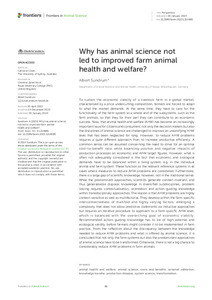| dc.date.accessioned | 2024-03-05T15:55:45Z | |
| dc.date.available | 2024-03-05T15:55:45Z | |
| dc.date.issued | 2024-01-05 | |
| dc.identifier | doi:10.17170/kobra-202403059718 | |
| dc.identifier.uri | http://hdl.handle.net/123456789/15528 | |
| dc.description.sponsorship | Gefördert durch den Publikationsfonds der Universität Kassel | |
| dc.language.iso | eng | |
| dc.rights | Namensnennung 4.0 International | * |
| dc.rights.uri | http://creativecommons.org/licenses/by/4.0/ | * |
| dc.subject | animal health and welfare | eng |
| dc.subject | animal science | eng |
| dc.subject | costs and benefits | eng |
| dc.subject | external validation | eng |
| dc.subject | knowledge transfer | eng |
| dc.subject | production diseases | eng |
| dc.subject | system science | eng |
| dc.subject | transformation | eng |
| dc.subject.ddc | 570 | |
| dc.subject.ddc | 590 | |
| dc.title | Why has animal science not led to improved farm animal health and welfare? | eng |
| dc.type | Aufsatz | |
| dcterms.abstract | To sustain the economic viability of a livestock farm in a global market, characterised by a price undercutting competition, farmers are forced to adapt to what the market demands. At the same time, they have to care for the functionality of the farm system as a whole and of the subsystems, such as the farm animals, so that they for their part they can contribute to an economic success. Now, that animal health and welfare (AHW) has become an increasingly important issue for citizens and consumers, not only the decision makers but also the disciplines of animal science are challenged to improve an unsatisfying AHW level that has been neglected for long. However, to reduce AHW problems requires a quite different approach than to increase productive efficiency. A common sense can be assumed concerning the need to strive for an optimal cost-to-benefit ratio while balancing positive and negative impacts of production processes on economic and AHW target figures. However, what is often not adequately considered is the fact that economic and biological demands have to be balanced within a living system, e.g. in the individual animal and farm system. These function as the relevant reference systems in all cases where measures to reduce AHW problems are considered. Furthermore, there is a large gap of scientific knowledge, however, not in the traditional sense. While the predominant approaches, scientists generate context-invariant, and thus generalisable disposal knowledge in diversified subdisciplines, problem solving requires contextualisation, orientation and action-guiding knowledge within transdisciplinary approaches. The reason is that AHW problems are highly context-sensitive as well as multifactorial. They develop within the farm specific interconnectedness of manifold and highly varying factors, emerging a complexity that does not allow predictive statements via inductive approaches but requires an iterative procedure to approach to a farm specific AHW level, which is balanced with the overarching goal of economic viability. Recommended action guiding knowledge has to be of high external and ecological validity, before farmers might consider it to be implemented in farm practice. From the reflection about the discrepancy between the knowledge needed to reduce AHW problems and what is offered by animal science, it is concluded that not only the farm systems but also the predominant approaches of animal science have to be transformed. Otherwise, there is not a big chance to considerably reduce AHW problems in farm animals. | eng |
| dcterms.accessRights | open access | |
| dcterms.creator | Sundrum, Albert | |
| dcterms.extent | 17 Seiten | |
| dc.relation.doi | doi:10.3389/fanim.2023.1214889 | |
| dc.subject.swd | Kosten-Nutzen-Analyse | ger |
| dc.subject.swd | Tiergesundheit | ger |
| dc.subject.swd | Wissensvermittlung | ger |
| dc.subject.swd | Tierhaltung | ger |
| dc.type.version | publishedVersion | |
| dcterms.source.identifier | eissn:2673-6225 | |
| dcterms.source.journal | Frontiers in Animal Science | eng |
| dcterms.source.volume | Volume 4 | |
| kup.iskup | false | |
| dcterms.source.articlenumber | 1214889 | |


